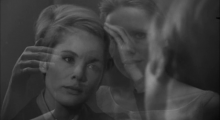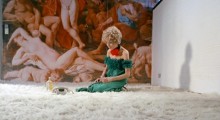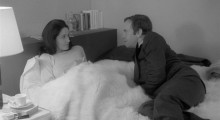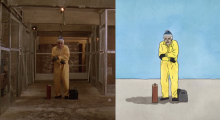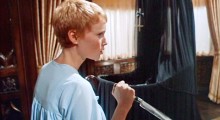Criterion Collection
-
Load and Play: Killers, Wage Slaves and Varda in the Sun

Agnès Varda in California Several directors of or related to the French New Wave flirted with Hollywood, from those who actually completed studio pictures (François Truffaut, Jacques Demy) to those whose efforts crashed and burned (most famously Jean-Luc Godard, whose proposed gangster picture with Robert De Niro and Diane Keaton remains one of the most tantalizing unmade films of all time). None of them managed to turn their detours in Los Angeles into as singular a cycle of films as Agnès Varda, whose two periods in the city (in the late ’60s and early ’80s) yielded five highly personal works […]
by Filmmaker Staff on Jul 23, 2015 -
“I Deliberately Cut an Unusual Rhythm”: Graeme Clifford On Editing Don’t Look Now

In this excerpt from the Criterion Collection’s supplements for their now-out edition of Nicolas Roeg’s 1973 Don’t Look Now, Graeme Clifford discusses the fine art of keeping people off-balance without being too obvious about it. “There is a comfortable way of editing, where people want to be unaware of cuts,” he explains. “In most movies, that’s generally the way you want to go. But in this movie, I deliberately cut an unusual rhythm. I would hold shots when there’d seem to be no reason to do so, or I would cut off them too quickly, or I would cut to things that were […]
by Filmmaker Staff on Feb 19, 2015 -
Watch: “Mirrors of Bergman” by :: kogonada

The latest in his series of video essays for the Criterion Collection brings :: kogonada face to face with Ingmar Bergman — more precisely, to the Swedish auteur’s use of mirrors in relation to women. Set to a reading of Sylvia Plath’s Mirror (“I am important to her/she comes and goes” nicely encapsulates Persona, at the very least), this short montage considers the meditative reflections — and interior revelations — across several of Bergman’s films. Watch above, and stay tuned for a longer :: kogonada/Bergman essay, set to accompany the Cries and Whispers release.
by Sarah Salovaara on Feb 12, 2015 -
Michael Ballhaus on Framing and Arguing with Fassbinder on The Bitter Tears of Petra von Kant

In this fascinating short interview released by The Criterion Collection, legendary D.P. Michael Ballhaus discusses working with Rainer Werner Fassbinder on one of the director’s best films, The Bitter Tears of Petra von Kant. After talking about how Fassbinder didn’t like to shotlist, Ballhaus describes one particularly difficult move and the director’s reaction when it wasn’t done just the way he wanted it. And even if Ballhaus weren’t an erudite interview, the clips alone here would be worth watching. The Bitter Tears of Petra von Kant is now out in standard def and Blu Ray from Criterion.
by Scott Macaulay on Jan 18, 2015 -
Watch: Why Are Christmas Films So Bleak?

Five days behind schedule, here’s a great Criterion essay from Michael Koresky on the bleak sentiments behind some of cinema’s classic and overlooked Christmastide tales. Suggesting the holiday’s proximity to winter solstice, and thus, the death of light, Koresky explores the backwards tendency to characterize a time of joy and harmony with mortality, existential crises, and dysfunction in Mon Oncle Antoine, My Night at Maud’s and A Christmas Tale. I’d scarcely be the first to suggest how peculiar it is that the quintessential all-ages Christmas film, It’s A Wonderful Life, is centrally preoccupied with suicide.
by Sarah Salovaara on Dec 30, 2014 -
Watch: :: kogonada Compiles Criterion Designs

Criterion Collection recently put out the coffee table book to end all coffee table books, Criterion Designs. A compilation of the illustrations, sketches and concept art behind the label’s impeccable covers and graphics, the book presents an inside look at the highly elaborate design process. Our recent 25 New Face :: kogonada has created a nice bumper for Designs, with seamless cuts between the films and their illustrations, from Charlie Chaplin to Wes Anderson. Check it out above.
by Sarah Salovaara on Dec 5, 2014 -
Watch: Anatomy of a Gag in Jacques Tati’s PlayTime

In honor of the Criterion release of The Complete Jacques Tati, David Cairns looks at the building blocks of the auteur’s visual gags in PlayTime, his finely choreographed exploration of technology and the modern era. In particular, Cairns examines Tati’s use of reflections and mirror images, as well as the illusion of space, which all play into the rigidity of the film’s expansive set pieces and its fractured narrative.
by Sarah Salovaara on Oct 30, 2014 -
Watch: William Friedkin Visits Criterion’s Offices

In the latest edition of “a famous person visits the Criterion Collection’s offices,” William Friedkin drops by to browse. Sighting Sunday Bloody Sunday, he remembers that as another film nominated for Best Picture the year he won with The French Connection. Segeuing from memory to pro-digital polemic, he says that the Criterion’s editions preserve films as they were meant to be seen, unlike movie theaters, where prints are “scratched up.” He also praises “one of Walter Huston’s greatest performances, The Devil and Daniel Webster” and talks up Jules Dassin’s Brute Force. “I never thought I’d see this again,” he says, […]
by Vadim Rizov on Oct 7, 2014 -
“Even If It’s a Bad Movie, You Get a Good Running Commentary”: Slavoj Zizek at the Criterion Offices

Philosopher and critic Slavoj Zizek stopped by the Criterion offices the other day, resulting in this video in which he talks his way through some of the titles in the stockroom. In just five minutes he tosses off tons of quips and instant analyses about films like Louis Malle’s Murmur of the Heart (“It’s one of those nice, gentle French movies, where you have incest”), Werner Herzog’s Fitzcarraldo (“a pretentious fake” but with a good commentary track), and Peter Weir’s Picnic at Hanging Rock, which he compares to Tarkovsky’s Stalker.
by Scott Macaulay on Sep 29, 2014 -
Watch: Roman Polanski on Making Rosemary’s Baby

Got 47 minutes? Good, because you’ll want to watch this documentary from the Criterion Collection about the making of Roman Polanski’s rightly beloved Rosemary’s Baby. Present and accounted for are producer Robert Evans, with his legendary voice still intact, star Mia Farrow and Polanski himself, who recounts how Evans got in touch with him to consider directing Downhill Racer (which became Michael Ritchie’s feature debut) and sent over that script and a galley of Rosemary’s Baby, which the producer asked him to look at first. While the director initially thought it was a “kitchen melodrama for television,” Polanski got sucked […]
by Vadim Rizov on Sep 23, 2014


